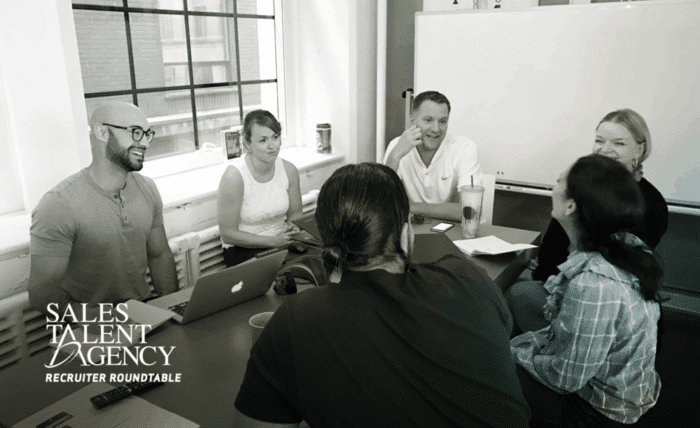Today’s business world can be really confusing when managing your career. How to meet potential employers? How to dress for an interview? How to negotiate your offer or a raise? All of these topics and more are discussed in our Recruiter Roundtable series, where we invite a diverse group of Sales Talent Agents to share their ideas and debate the topics important to you. In today’s roundtable we discuss best practices of identifying what makes a great sales job.
 Todays panel clockwise: Dan, Jill, Brittani, Arkan, Sheila
Todays panel clockwise: Dan, Jill, Brittani, Arkan, Sheila
Make sure there’s an audience for what you’re selling
Jill: With so many start-ups in the job landscape, how do you determine which are worth working for? I ask this because while some are amazing others are getting quite a bit of funding without a whole lot of success. What do all of you think?
Brittani: I think first and foremost you have a true value proposition. Do you have a clear problem you are trying to solve? If so, how are you uniquely able to solve it? Lastly, what proof is there that you’ve solved it? If you don’t have any of these three things- run for the hills!
Arkan: That’s exactly right. If you don’t have a clear and strong value proposition, the money won’t be there.
Determine who you would be working with and who your leadership team is
Sheila: Management is one of the biggest keys to a good sales role. It’s important that you’re looking at the company, the people who work there, the product, the longevity of the employees… Resources like Glassdoor are great to find common threads, but I don’t think anyone should use Glassdoor necessarily as gospel.
Jill: Glassdoor isn’t always accurate, so I would take any review with a grain of salt. The reality is that you will see some great reviews and some horrible reviews. Really what you want to look for is consistency. If you see multiple negative reviews about management, that is probably a red flag. That said, if this is the case make sure to look at the date they were posted. Sometimes companies restructure and change so it’s no longer painting an accurate depiction. I would also look for long tenure of employees, that typically signifies if a company is worth sticking around at.
Brittani: Yes. You want to make sure that the team around you that has been there is established. Obviously, if it’s a startup that’s an exception. If you’re a candidate far along or in the final rounds of the interview process, I would ask to sit with someone in a similar role and have a conversation with them about their team and what their role looks like. In fact, it may be even better to reach out on your own to ensure you are not heavily influenced by the bias of a top performer.
Arkan: I would strongly suggest this step. Just to ask about the specific day-to-day aspects of the role in regards to workload, tasks, that sort of thing. It’s important to find out the nitty gritty because you want to make sure that you will be in a position that challenges you and will make you better in the future. Bonus points if you have a personal connection– that’s huge. It’s always much more transparent.
Investigate what the role entails
Dan: For me, one of the toughest things is to determine what a role entails. You can have two positions with the same title but be vastly different roles. I think the best thing to do is to wait until the interview process and actually ask about the role and what it entails, in terms of specifics. Ask directly: are you going to be getting all the leads? Are you going to be able to do your own prospecting? What is the focus of the role? Are you going to have face time with clients?
Jill: To further that point, before you even go to the interview process you can always start off with Linkedin. Typically larger organizations, especially Fortune 500 companies, employ multiple people with the same job title so you can look across their profile descriptions and group commonalities of their day-to-day.
Brittani: That’s a great point Jill when the company is a large one. What about for smaller organizations that are less established? Sometimes the role descriptions aren’t always so cut and dry. You can’t always go into the role expecting X, Y and Z because the role is going to develop and evolve overtime and you’re going to pick up extra responsibilities.
Sheila: It’s funny because I feel like every candidate wants to ask about role specifics… but why? If you are at a good company with a good leader I think at the end of the day it doesn’t matter. Especially 2, 3, or even 4 years down the road. From my experience, most entry level roles are pretty general and as time goes on it is only natural to specialize, we start to see that here within Sales Talent Agency when people have been here for a few years. It’s hard when you have little to no experience or you’re just starting off.
Look for a company that offers training and development opportunities
Dan: I think one of the biggest ways to detect growth is to ask for a 3-5 year plan. Where can you expect to be in that time? What is the natural progression of the role? It is also good to know these things within yourself so you can strive to achieve them.
Brittani: A lot of people think of building their career as moving up the career ladder but in reality it’s more like a jungle gym. Obviously we should be doing things to progress our careers, but you also need to do something that you love. There are two questions I think you should consider asking yourself that not everyone does: 1) how can you move up? and 2) how can you move sideways? Definitely look at what’s going on in the marketplace and keep an eye out for opportunities that are exciting to you. I strongly suggest networking events.
Dan: We are truly in an enviable position at Sales Talent Agency because we are exposed to all sales roles across the board. I am exposed to literally, hundreds of companies on a weekly basis.
Have a clear idea of what the market is paying and what you are looking for
Brittani: I think in an entry level role the most important thing is what skills you are going to acquire from that role and how you are going to develop. Of course, you need compensation that is going to finance your life. I think at minimum you need to consider 35k as a base salary. From there it obviously goes up and you can ask for more once you start to prove yourself. Another thing with sales is that you have to consider the commission variable. A good way to assess this is to ask what their top performer is making, what people in the middle are making and how the commission structure is broken down and what you have to do on a weekly, monthly and quarterly basis to achieve that target.
Dan: I feel like 100% commission is not very fashionable these days for companies to offer. That said, if you do see this kind of offer, it’s really only suitable for two types of salespeople: those who are amazing and can crush their quota and those who, well, can’t get any other job.
Jill: Exactly, I wouldn’t recommend accepting something like that if you’re just beginning your sales career.
Use the beginning of your career to gain experience before establishing your industry of choice
Arkan: At the beginning of your sales career I think it’s important to get your foot in the door, so industry doesn’t matter too much at that stage. As you gain a little bit of experience you will start to realize that while sales is similar across the board, each industry is a little bit different. Once you’ve established yourself for several years working at a place with the same role, then you want to hone your skills and start thinking about specializing, whether it’s in software sales or real estate. It’s harder to make that move later in your career which is why you don’t often see people transition from medical sales to software sales even though it is entirely possible.
Sheila: Another thing I’ve noticed is that new grads or students are very keen on 2 or 3 industries most often being technology or consumer packaged goods. That’s typically because they have exposure to them on a daily basis… but there is so much more than that.
Jill: My advice would be to remain open about industry and take on sales roles that offer transferable skills so you’re not stuck in one particular industry. Try to find a role in a company that has really established training, development and mentorship. That alone could overcome the fact that you’re in an industry that you’re not really that into.
Brittani: It’s always unfortunate when I see people judging a role based on industry. Learning doesn’t always have to be positive but it has to be exhaustive. There are ebbs and flows in every role- it’s just whether or not you get complacent there. That’s my personal stance.
Look for transparency throughout the job process as well as in the organization
Sheila: This is a huge one for me because I don’t ever want to feel nervous to ask my boss a question, especially if it’s a bold one. I need to know upfront whether or not I can get that transparency, especially when it comes to professional development.
Brittani: I agree, Sheila. You have to know where you stand, what the compensation will be, who your bosses will be, what you have to do to succeed. None of these things should be a surprise. It tells you a lot about a company when they are transparent early on.
Determine your personal motivating factors and incentives, so you can find a role that fits your needs
Jill: While ‘motivation’ is a huge umbrella term, it’s important to decide what factors are most important to you when looking for a job and whether or not the employer can meet your needs and expectations. Perhaps a motivating factor to you is a certain amount of money… maybe it’s a manageable workload because you have a family and don’t want to work 12 hour days anymore… maybe you don’t want to have to report into C level executives. These are all things you need to look at.
Dan: A lot of companies advertise jobs based on little perks like “we have a pingpong table” or “we offer free beer!”. The reality is, for me personally, I’d rather make more money and pay for my own $6 beer.
Arkan: Right- and while ‘unlimited vacation’ seems tempting in theory, in practice, top performers typically can’t afford to take countless days off because they are super focused on hitting their targets. I’d much rather solid health benefits or if the company offers a stock plan.
Sheila: All quality points made today. Thanks for everyone’s advice on this Recruiter Roundtable! I look forward to the next one!






